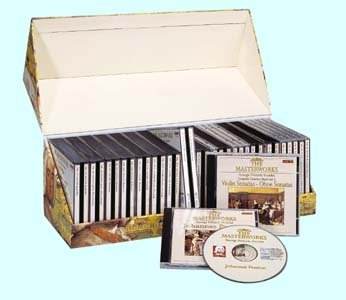Handelís suites of
music for the Royal Fireworks and the
Water Music are such iconographic pieces
that they are available in a multitude
of versions. Popularised in transcriptions
for full orchestra by people like Hamilton
Harty, the music in both works has been
recorded by ensembles ranging from full
symphony orchestra to original instruments,
not forgetting the recordings which
have gone back to Handelís postulated
original wind band version for some
of the music.
These two discs from
Brilliant illustrate two of the different
attitudes to recording Handel. Alexander
Gibson and the Scottish Chamber Orchestra
have opted to record Handelís text of
the music for the Royal Fireworks but
using profoundly traditional playing
techniques and styles. Phrasing is strictly
19th century throughout,
meaning that Handelís string textures
have a smoothness and opacity that he
probably did not intend. Rhythmically
this is a very solid performance, no
attempt is made to give the pieces anything
like the sprung rhythm and bounce that
they require. That said, if you want
a full orchestral version of the music,
this is a pretty good performance. The
instrumental playing is of a high standard
and Gibson keeps the brass and drums
reasonably in check. The coupling from
the original disc is the Oboe concerto
no. 3. Again, the string accompaniment
is opaque and anachronistically phrased.
But Robin Millerís limpid oboe playing
manages to lift the performance into
another sphere. It is such a pity that
they did not record some more. Instead,
as fillers, there is rather a motley
selection of pieces played by the Orchestra
of St. Johnís Smith Square, the Janacek
Philharmony and the Lodz Chamber Orchestra.
The Orchestra of St. Johnís manage
to make a neat enough turn of the ĎArrival
of the Queen of Shebaí. But Hartmut
Haenchen and the JanŠček Philharmony
manage to turn the Harp Concerto in
B flat major into something charming
which barely resembles Handel at all.
Turning to the Water
Music suites, an entirely different
attitude to recording is displayed.
Robert Haydon Clark was a pupil of Thurston
Dartís and he has done much good work
carrying on from Dartís fine performances
of Baroque music on modern instruments.
Clarkís Water Music is a reasonably
stylish achievement and is a decent
period-aware performance on modern instruments.
This is a performance that has appeared
on super-budget disc before - see fuller
review
Robert Hugill

